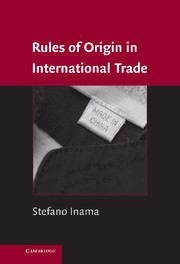Book contents
- Frontmatter
- Contents
- List of Figures
- List of Tables
- List of Acronyms
- Preface
- 1 Efforts to Establish Multilateral Rules
- 2 The Uruguay Round Agreement on Rules of Origin: The Harmonization Work Program of Nonpreferential Rules of Origin
- 3 Preferential Rules of Origin
- 4 The Economics of Rules of Origin
- 5 Drafting Preferential Rules of Origin
- 6 The Administration of Rules of Origin
- Index
4 - The Economics of Rules of Origin
Published online by Cambridge University Press: 18 August 2009
- Frontmatter
- Contents
- List of Figures
- List of Tables
- List of Acronyms
- Preface
- 1 Efforts to Establish Multilateral Rules
- 2 The Uruguay Round Agreement on Rules of Origin: The Harmonization Work Program of Nonpreferential Rules of Origin
- 3 Preferential Rules of Origin
- 4 The Economics of Rules of Origin
- 5 Drafting Preferential Rules of Origin
- 6 The Administration of Rules of Origin
- Index
Summary
The Basic Tenets of Rules of Origin and Economics
Until recently, trade economists paid little attention to rules of origin. The literature on the economic effects of rules of origin was comparatively limited up to the beginning of the 1990s. In the traditional literature, the main issues that were approached were the following:
the effect that rules of origin have on the allocation of resources within one country, and hence on efficiency and welfare;
whether rules of origin guarantee the achievement of the objectives that underlie the trade instrument under which they are adopted;
the effect of rules of origin in schemes of economic integration (FTAs, customs unions) particularly as regards the incentive they might represent for “rent seeking”/lobbying activities.
Most of the economic models that were developed did not directly refer to rules of origin but, more generally, to schemes of “local content protection.” According to these schemes, local producers are allowed to import inputs and raw materials free of duty so long as the final products contain a minimum percentage of local value added. These models can be adapted to rules of origin issues because, in both cases, the failure to reach a minimum of local value-added results in the obligation to pay a tariff.
- Type
- Chapter
- Information
- Rules of Origin in International Trade , pp. 337 - 388Publisher: Cambridge University PressPrint publication year: 2009



